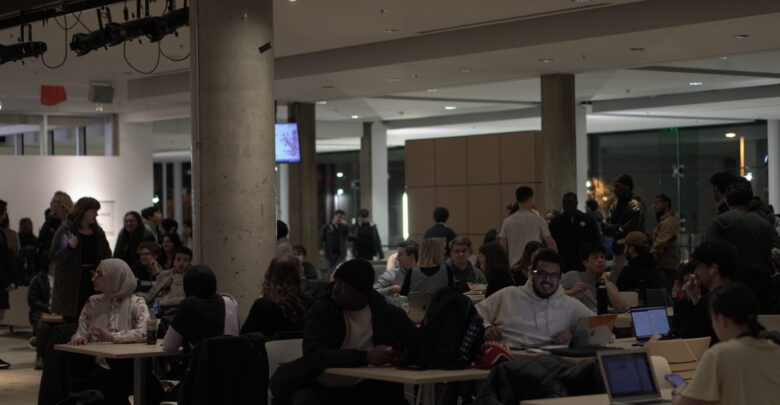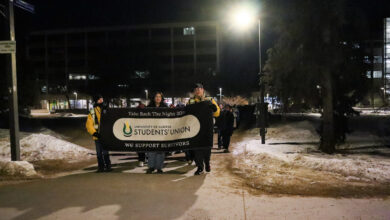Vice-president (academic) candidate still disqualified following first DIE Board appeal
Farah Elgaweesh's second appeal still awaits DIE board decision.
 Lily Polenchuk
Lily PolenchukIn the 2024 Students’ Union elections, presidential candidate Lisa Glock and vice-president (academic) candidate Farah Elgaweesh were disqualified following multiple rulings made by chief returning officer (CRO) Jacob Verghese. At the time of publication, 18 rulings have been released. Of those, two were against Glock and six against Elgaweesh.
Following her disqualification, Elgaweesh filed two hearing applications to the Discipline, Interpretation, and Enforcement (DIE) Board to appeal the rulings against her. The first appealed CRO ruling #5, and the second appealed rulings #7, #8, and #16.
On March 6, in ruling #5, Elgaweesh was fined $32 for using unapproved campaign materials in unauthorized areas. On March 7, the Elections Office fined Elgaweesh an additional $160 for campaigning and posting on social media accounts that were not approved by the Elections Office. This fine put her over the $550 candidate spending limit, ultimately disqualifying her from the race. Four more rulings were levied against Elgaweesh since her disqualification.
On March 13, Elgaweesh’s first hearing occurred over Zoom. On March 19, the DIE Board released its decision following the hearing. Although the DIE Board lowered her fines, Elgaweesh remains over budget. She remains disqualified following the first hearing, but awaits the results of the second.
Elgaweesh takes “full responsibility” for her actions, filed two appeals to DIE Board
In her first appeal, Elgaweesh asked the DIE Board to: overturn the fine levied for Elgaweesh reportedly using an unapproved social media account; reduce the $10 fee per unapproved story levied to $2, as per the nomination package; order Verghese to provide all email communications pertaining to approved campaign materials to the DIE Board; and order Students’ Council to review and amend Bylaw 320 “to prevent these type of situations from arising in the future.”
As well, the appeal asked that the DIE Board order the SU to tabulate the results of the vice-president (academic) race, then present the results to both the DIE Board and Elgaweesh. At the time of publication, the votes for the vice-president (academic) race have not yet been released.
If granted, the total fine amount levied to Elgaweesh would lower to $62, the appeal read. As this would be within her campaign budget, her disqualification would be overturned.
“As a result, it is unfair for her to be disqualified due to Verghese’s inability to properly exercise his role and responsibilities,” the appeal read.
The appeal alleges that in a meeting with the Elections Office on March 6 at 8:30 a.m. to discuss connections with third-party campaigning, Elgaweesh, Glock, vice-president-elect (external) Abdul Abbasi, and vice-president-elect (student life) Renson Alva were told that fines would not result in a disqualification if they exceeded campaign budgets. Instead, Verghese allegedly told candidates that they would not be reimbursed for campaign expenses if they went over budget as a result of fines.
In an interview with The Gateway, Deputy Returning Officer (DRO) Sithara Naidoo was asked about this meeting. Naidoo declined to comment, citing that the appeals process was still ongoing.
According to the appeal, on March 6 at 11:26 a.m., Elgaweesh was notified of a potential bylaw violation by Verghese over Whatsapp. Elgaweesh allegedly used her personal social media account — not the account approved by the Elections Office — to post campaign materials. As well, the appeal alleges that “Verghese created a culture of resolving violations through informal resolutions often dealt with over the phone and via text message rather than through emails and CRO rulings.”
Additionally, Elgaweesh’s appeal alleged that Verghese failed to communicate with Elgaweesh “in a fair and timely manner.” As well, he did not respond to Elgaweesh or members of her campaign within the 24 hour time-frame laid out in the nomination package, and took several days to approve campaign posts, the appeal read. Elgaweesh alleged that he responded to other candidates much quicker. Lastly, the appeal alleges that Elgaweesh wasn’t informed of violations in a timely manner.
In an interview with The Gateway on March 14, Elgaweesh said there was a lack of communication between her and Verghese, which “disadvantaged [her campaign] on multiple occasions.” She mentioned that if the CRO doesn’t respond within 24 hours, a complaint can be made against them.
“I never intended to harm anyone,” she said. “I just wanted to get my campaign materials, and that’s why I never filed that complaint.”
“Given the number of rulings that were filed this year, I think it’s hard not to think that there were a lot of fines given as opposed to taking a proactive approach to addressing some of these issues.”
Lastly, the appeal read that Elgaweesh never intended to break bylaw, or to use her private social media to campaign. The appeal mentioned that fines are used to counter any advantages gained by a candidate when they contravene a bylaw. According to the appeal, Elgaweesh’s campaign gained no advantage by posting on her private social media.
On March 7 at 4:09 p.m., Verghese notified Elgaweesh that CRO ruling #5 had been released, and that as a result of the penalties, she was disqualified. In an interview with The Gateway, Naidoo said that the Elections Office encouraged Elgaweesh to continue campaigning, in case she chose to appeal the ruling.
According to the decision document, the DIE Board was addressing two issues: whether or not Elgaweesh’s posts on social media broke the rules laid out in the nomination package, and what the appropriate fines would be. The DIE board found that Elgaweesh posted 14 posts on her campaign account. Verghese approved seven of these posts, but the other seven were unapproved. In her appeal, Elgaweesh alleged that the posts did not constitute campaign materials.
Of unapproved posts, the DIE Board found that only the first post “[did] not constitute unsolicited campaign materials.” According to the DIE Board, the post did not encourage users to vote for Elgaweesh. As well, it linked to content that was already publicly available. However, the other six unapproved posts encouraged users to vote for Elgaweesh, or mentioned that she was running for vice-president (academic).
Additionally, they found that the $160 fine initially levied against Elgaweesh was not correct. Instead, the correct fine is $98.40. The fine included a $60 base fee, as well as $10 plus $.10 for every person the posts reached. Elgaweesh’s Instagram account had 384 followers. Although her fine was lowered, it still pushed her over the campaign budget.
Elgaweesh said she had a lack of institutional knowledge, which contributed to her amassing multiple fines. She said that she is the youngest person who ran in the 2024 SU Elections.
“I wanted to get in that fresh perspective as somebody who has not been clouded by institutional experiences,” she said.
“I take full responsibility for my actions. Even though I was trying my best the entire time to comply with the rules and bylaws, I understand that I did have that lack of institutional knowledge.”
Elgaweesh appeals three CRO rulings, decision not yet announced
On March 18 at 8:00 a.m., Elgaweesh’s hearing for her second appeal was held over Zoom. At the time of publication, the DIE Board’s decision has yet to be announced.
In the second appeal, Elgaweesh alleged that on March 11, Naidoo notified her of CRO rulings #8, #15, and #16. That same day, ruling #7 was posted on the SU’s website. However, Elgaweesh said neither her or her campaign received a copy of the ruling from Naidoo or Verghese.
Ruling #7 found that Elgaweesh had contravened bylaw to gain an advantage in the election by campaigning in the Students’ Union Building (SUB), which is prohibited under SU bylaw. The ruling alleged that Verghese had seen Elgaweesh’s campaign manager campaigning in SUB, and fined Elgaweesh $26.
As well, ruling #8 alleged that Elgaweesh acted in bad faith following a conflict between Elgaweesh’s campaign manager and that of vice-president (academic) candidate Layla Alhussainy. However, Elgaweesh told The Gateway that her campaign manager was never involved in the conflict, and that Verghese had misidentified a volunteer instead.
According to Elgaweesh, one of her volunteers posted a story on her Instagram account regarding her attendance at the forums. The volunteer also posted a note on Instagram, encouraging students to vote for Elgaweesh because she had attended all five forums. These were posted following an absence of Alhussainy at the Myer Horowitz forum on March 4 because of a medical emergency. In response, Alhussainy’s campaign manager made a post, which was inferred to be about Elgaweesh’s volunteer’s post.
Elgaweesh said she wasn’t aware of her volunteer’s posts. She told Verghese she would ask the volunteer to take them down. Both candidates’ campaigns filed complaints to the CRO. Alhussainy’s manager and Elgaweesh’s volunteer were asked to post apologies on their Instagram stories. According to the ruling, Elgaweesh’s volunteer’s Instagram account was made private following this incident. As a result, Alhussainy’s team didn’t see the apology. Elgaweesh said that her volunteer’s account was private throughout the campaign period.
Not enough evidence supplied the Elections Office to suggest third-party campaigning with SJP, Elgaweesh says
During the SU elections, the group Students for Justice for Palestine (SJP) allegedly participated in proxy campaigning. During the campaign period, SJP endorsed specific candidates based on their support for Palestine. Additionally, they encouraged students to vote for endorsed candidates through social media and tabling on campus.
Ruling #16 alleged that Elgaweesh’s campaign benefited from SJP’s campaigning, and that she contravened Bylaw 320, Section 11(5), which states that candidates can distance themselves from third-parties conducting campaign or elections activities. Naidoo told The Gateway that a third-party is any group or person that is not registered with the SU. As SJP is not a registered student group, they are a third-party.
The evidence listed in the ruling is that one of Elgaweesh’s campaign managers, Marija Cvetkovska, is a member of SJP. If an attendee asks a question in a forum, they have to state their names and affiliations transparency. When Cvetkovska asked a question during the Indigenous Students’ Union (ISU) forum on March 1, she said that she was Elgaweesh’s campaign manager and a member of SJP.
As well, the ruling stated that Elgaweesh did not distance herself from SJP until after the ISU forum. However, Elgaweesh was not penalized by the Elections Office. Instead, the ruling states that the Elections Office wanted to “emphasize the lack of clarity around third-party bylaw and the degree to which SJP, as a third-party, was involved in the 2024 General Elections.”
On March 5, SJP endorsed Elgaweesh and several other candidates on Instagram. According to Elgaweesh’s appeal, she reached out to SJP on that same day to clarify that she didn’t consent to the endorsement, and that it contravened SU bylaws. In response, SJP thanked her for the information but declined to remove the post.
Elgaweesh told The Gateway that she felt there wasn’t enough evidence supplied by the Elections Office to suggest that third-party campaigning did occur. She clarified that Cvetkovska is not a member of SJP, but is on their mailing list. She added that neither she nor Cvetkovska knew what an affiliation was ahead of the ISU forum. The appeal states that Elgaweesh’s campaign “took every reasonable step” in distancing themselves from SJP.
Both appeals list “the competence of Verghese in executing his duties” as CRO a key issue. The second appeal expressed that fines levied in ruling #7 were excessive. It further alleged that Verghese didn’t alert Elgaweesh’s team of a potential violation before administering a fine. As well, the appeal alleged that Verghese did not issue the fine within two business days of the violation occurring.
The appeal asked the DIE Board to: overturn CRO rulings #7, #8, and #16, unless Verghese proved that he notified the chief tribute of the DIE Board with the reason for extending the investigative period, and when the ruling would be released, as stated in Bylaw 320; and order “that Verghese release the complaint forms for these alleged violations alongside the date and time that they were submitted.”
2024 SU election “busier than usual,” DRO says
Naidoo told The Gateway that there is a lot of misinformation circulating in regards to the 2024 SU elections. She added that this election is busier than usual. The 2024 SU elections saw the highest number of CRO rulings since 2020, which had eight.
“I worked in the elections office in 2022. I think we went to the DIE Board once, and then the case got dismissed,” Naidoo said. “It’s just a year where students feel like they want to exercise that right to appeal more than others, which is totally okay to do.”
Naidoo said that the rulings are based on bylaw infractions, and penalties range in severity. She added that bylaw infractions are handled “informally as much as possible.” This is done through meetings and warnings as opposed to official rulings, she said.
The Gateway asked Naidoo what her thoughts were regarding the concerns from candidates that campaign rules were not communicated clearly. Naidoo responded that all campaign rules are included in the nomination package that candidates receive. She added that the nomination package said that it’s candidates’ responsibility to “inform themselves on bylaw and ask for clarification if they have any questions.”
When asked if the Elections Office stood behind their decision to disqualify both Elgaweesh and Glock, Naidoo said yes. The Gateway asked Naidoo if there are plans to release the votes for the vice-president (academic) race, and who won based on the votes. Naidoo said that Alhussainy won, but declined to comment on when or if the vote amounts would be announced.
This is an evolving story. If you have any information pertinent to the story, please reach out to [email protected].
CORRECTION: This article was updated on March 25 at 10:02 a.m. to clarify that the Elections Office stood behind their decision to disqualify Elgaweesh and Glock. An earlier version of this article said that Naidoo declined to comment. The Gateway regrets this error.




